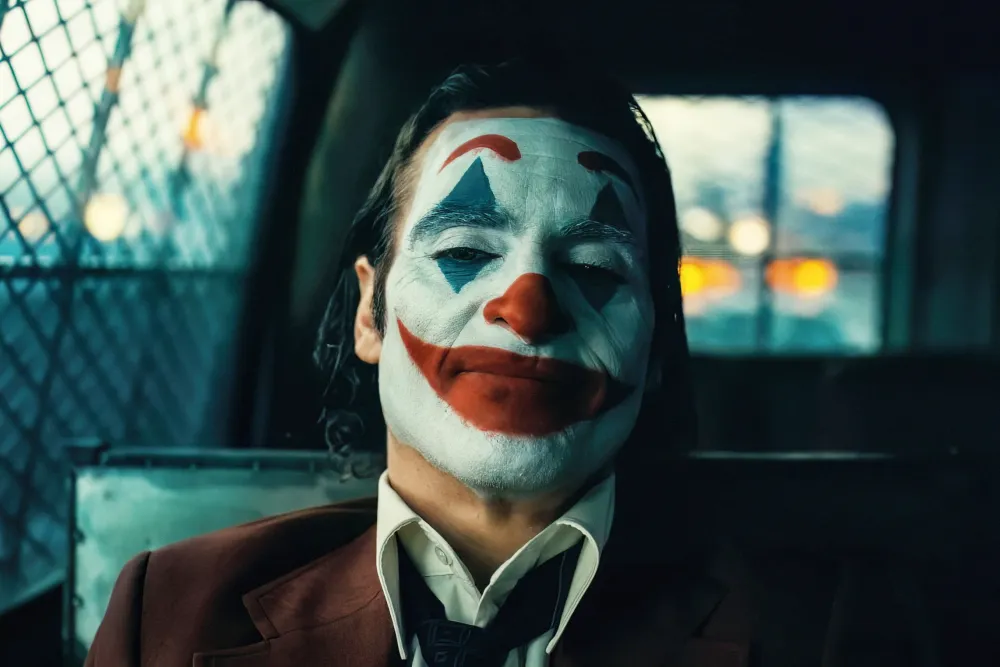
For all its flaws, and it has plenty, Joker: Folie à Deux doesn’t commit the sin of lazily recycling the beats of its predecessor. The first Joker, which Todd Phillips directed to multiple Oscars and a massive box-office haul (not to mention an attendant and insufferable discourse), was a piece of faux provocation; it pretended to have interesting ideas, but it really just wallowed in its self-made sea of anger and unpleasantness. It would have been easy—and, if the opening-weekend receipts are anything to go by, commercially advisable—for Phillips to just run that material back, treating/subjecting viewers to another crude fantasy of toxic resentment and violent retribution. Instead, he and co-writer Scott Silver have radically reversed course, delivering a strange and off-kilter movie that’s part courtroom drama, part jukebox musical, and part twisted romance. (The subtitle refers to a shared delusion.) The incel goons who loved the first one must be livid.
For my part, I am less furious than frustrated. Conceptually speaking, Joker 2 is something of a coup, melding genres and skimming comic-book lore in the service of a fairly original and gratifyingly odd vision. So why is the whole thing such a wan and boring affair? Here is a movie where the hero fantasizes about hosting a late-night variety show with his beloved who threatens to shoot him on stage, then later dresses up as a clown before making his closing argument to a jury. That’s weird! Yet while the production should crackle with offbeat energy, Phillips’ execution is so lackluster that the whole enterprise comes off as limp and half-hearted.
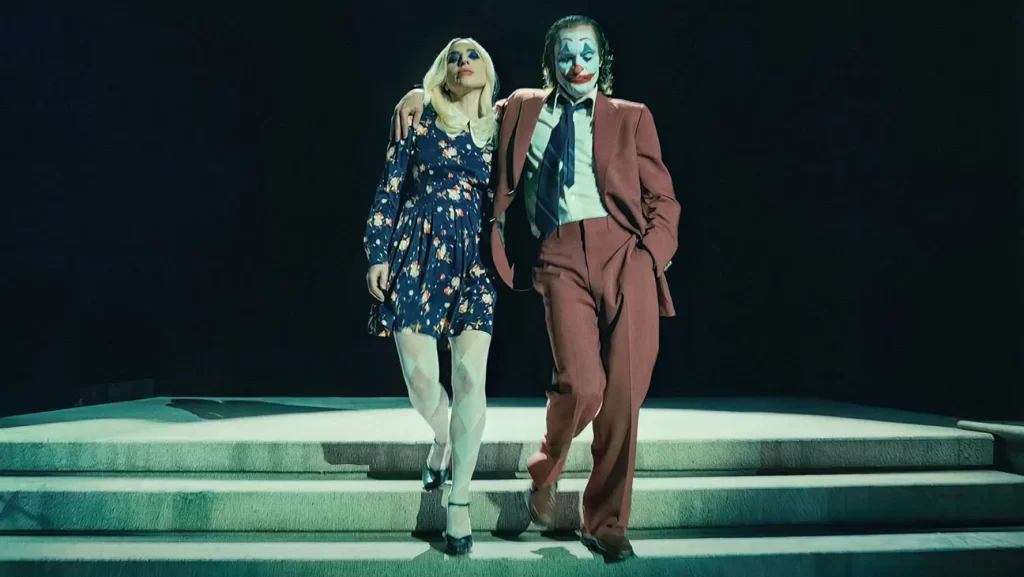
That accusation doesn’t apply to Joaquin Phoenix, who once again imbues Arthur Fleck with a sickly, shriveled magnetism. The actor is less visibly gaunt this time around, but he remains creepily unsettled, concocting a syncopated performance that doesn’t so much understand Arthur as recognize that he’s a demented figure beyond understanding. In fact, Arthur is most disturbing when he’s happy, and Phoenix—an intensely watchable presence, never more so than when he’s dancing arrhythmically—conveys the character’s sense of newfound ardor with disquieting sincerity.
The subject of Arthur’s affection, of course, is Lee (Lady Gaga), a fellow Arkham inmate who’s better known to DC readers as Harley Quinn (or, if you’re going by fictional birth certificates, Harleen Quinzel). The nominal hook of Joker 2 lies in the prospect of Arthur discovering an admirer who comprehends his pathologies and connects with his raw-nerve emotions; when Lee sets a fire during a hospital screening of The Band Wagon, Arthur marvels at her impetuousness. Has this longtime loner finally found a romantic partner who shares his passions and perversities? Or is Lee just manipulating him like a parasitic moth attracted to the flame of his fame?
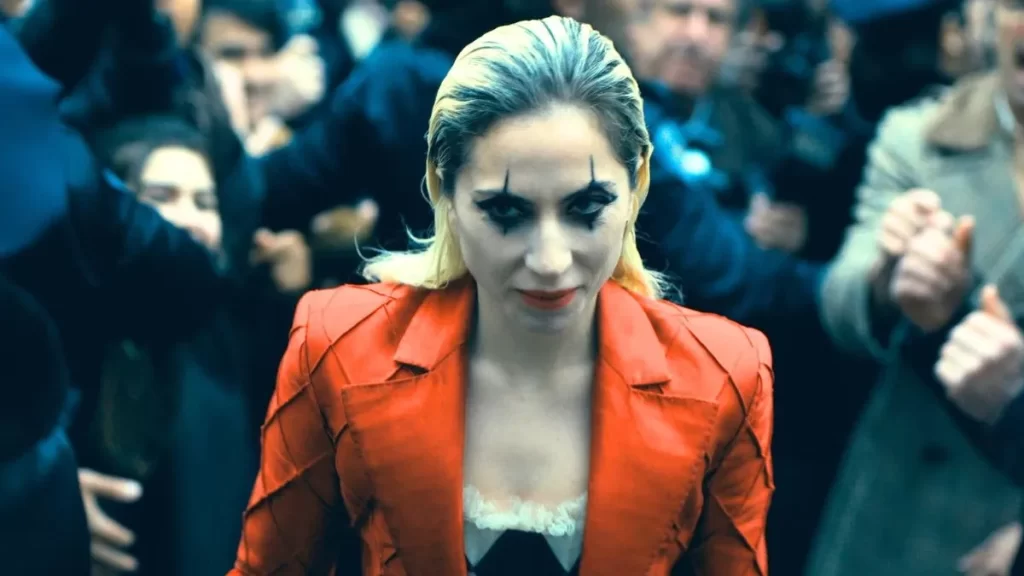
On the page this dichotomy might have seemed suspenseful, but on screen it possesses minimal intrigue. Phillips, whose filmography includes bro-centric comedies like Old School and the Hangover pictures, isn’t known for creating strong female characters, and Lee is an irritatingly flat and (ahem) shallow construction. With the exception of a (fantasy?) sex scene in Arthur’s solitary cell that proves strangely intimate, the pair never click as either mutually deranged lovers or antagonistic hotheads who elicit each other’s worst impulses. It’s an anti-romance, and even if that’s the point, it doesn’t make things any less dreary.
On the whole, it’s tempting to describe Joker 2 as anti-entertainment, but I don’t think Phillips is aiming to alienate his audience, even if he’s shifted the first film’s ugly themes in a less hostile direction. I just don’t think he’s good at this stuff. Take the musical angle. By all rights, a songfest featuring the dude from Walk the Line and the pop star of “Poker Face” should hum with boisterous enthusiasm. Yet the numbers here are largely staid and desultory; Phoenix’s voice is raspy (he’s best during the closing-credits ballad), and even Gaga rarely shows off the pipes that made her famous. More distressingly, any putative choreography is haphazard, with Phillips displaying little interest in visual rhythm. There are exceptions—Arthur grooving his way through a prison ward while singing Stevie Wonder captures some of his anarchic flair, and Phillips conjures a sort of heavenly white-brick road and finally lets Gaga loose on “Gonna Build a Mountain”—but most of the staging is uninspired, making you wonder if Joker 2 really wants to be a musical at all. (The string-heavy score, by Hildur Guðnadóttir, is more arresting than any of the bland vocal covers.)
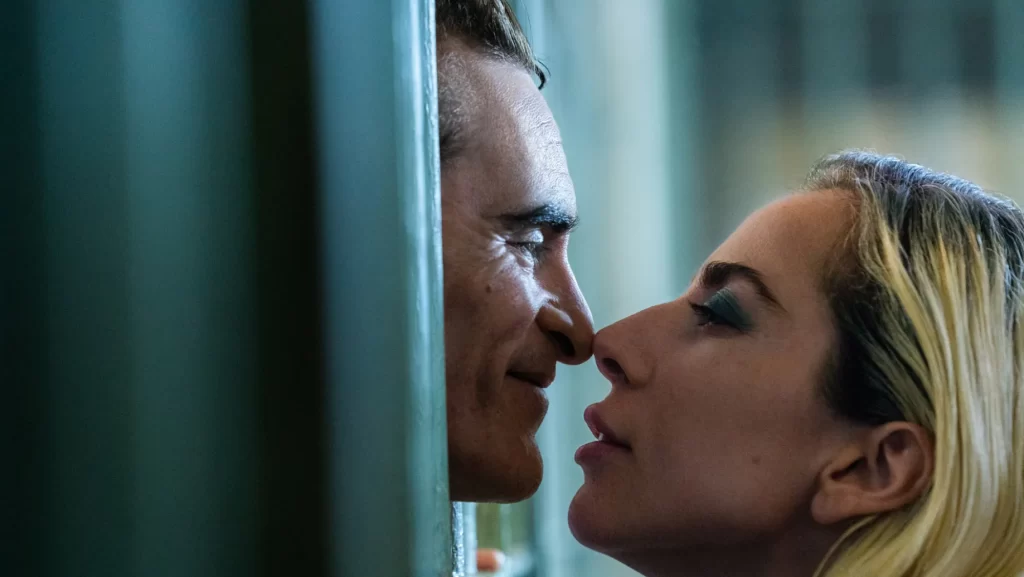
The movie’s story is in harmony with its music, which is to say it’s equally awkward and unappetizing. The plot involves Arthur’s trial for the murders he committed at the end of the prior picture, allowing Phillips to introduce Harvey Dent (Industry’s Harry Lawtey, unsteady) but mostly miring the proceedings in dull and functional dialogue. Cinematic courtroom proceedings are invariably engrossing, so it’s almost impressive how tedious Phillips makes his scenes of lawyerly bickering, despite Phoenix’s unruly flamboyance. The judge (Bill Smitrovich) repeatedly admonishes Arthur that he won’t allow the trial to devolve into a circus, but frankly Joker 2 could have used a bit more wildness and excitement.
It saves most of that for its finale, when Phillips unveils his big set piece: a lengthy tracking shot of Arthur driving and then sprinting through the city streets, leaving a trail of carnage behind him as he heads inexorably toward the freighted staircase that symbolized his erstwhile transformation from friendless loser into celebrity psycho. (The picture’s other noteworthy visual sequence is an early oner in Arkham that follows the shackled Arthur as he shuffles through the prison and out into the yard; it supplies the lovely image of rain-soaked black umbrellas that magically turn into bright pastels, like something out of a Jacques Demy film.) It’s striking in the abstract, but it doesn’t have any weight behind it; the concept of the Joker as a catalyzing messiah for the alt-right no longer carries the charge of incendiary rhetoric, the movie having abandoned it in favor of more personal concerns.
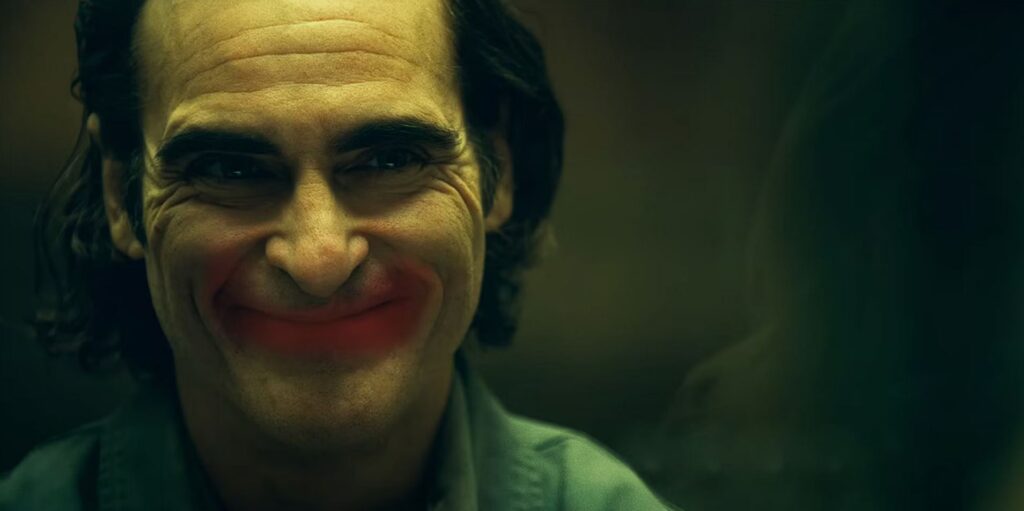
Which, again, was a perfectly sensible idea. As disappointing as I find Joker: Folie à Deux, I’m hard-pressed to actively dislike it; it manages to subvert genre expectations and develop its own identity, however muddled or dissatisfying. Yet Phillips seems to have channeled Arthur’s spirit of defiance into his own filmmaking, refusing (or just failing) to make an entertaining movie that properly leverages the mighty commitment of his lead actor. Maybe that makes him some sort of brilliant iconoclast, but I suspect the truth is more mundane: that this lumpy sequel, however admirably ambitious, remains consistently off-key.
Grade: C
Jeremy Beck is the editor-in-chief of MovieManifesto. He watches more movies and television than he probably should.
